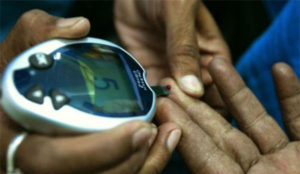Jamaicans Urged to Put a Stop to Diabetes
Dr. the Hon. Christopher Tufton, Minister of Health, has called upon all Jamaicans to take a stand against diabetes.
Raising the flag of awareness regarding how this disease can significantly affect one’s health and wellbeing, Tufton reminded us that World Health Day, celebrated on April 6, 2016, had one main aim: to ‘Halt the Rise of Diabetes’.
The number of people living with the disease has risen fourfold since 1980 to 422 million adults, mostly hailing from developed countries. WHO has published the first ever Global Report on Diabetes, which points out the need to increase awareness of how easily the disease can be contracted, and to strengthen preventive measures. Treatment of the disease also needs to be improved.
In Jamaica, there were 202,600 cases of diabetes in 2015. This number has tripled since the 1980s. Meanwhile, the Pan American Health Organization (PAHO) has stated that diabetes is the fourth leading cause of death in the hemisphere, after heart attacks, stroke and dementia.
If no measures are taken to end the problem, there will be approximately 110 million people battling diabetes in the hemisphere, by 2040. As is the case in the rest of the world, most suffer from Type 2 diabetes, which is caused by the body becoming resistant to insulin or when the body ceases to produce insulin. Genetics are sometimes the cause of this type of diabetes, though lifestyle factors are also determinant. Excess weight, for instance, has found to be a contributing factor, as has a lack of physical activity.

Diets which are high in sugar contribute to insulin resistance, by shunting inordinate amounts of glucose into the system. To compensate, the pancreas begin producing more insulin and when this situation become chronic, diabetes ensues. Type 2 diabetes has many unpleasant and painful symptoms, which include weight loss, fatigue, frequent infections, and blurred vision. Like Type 1 diabetes, Type 2 can decrease one’s lifespan, since it has associated conditions such as high blood pressure, kidney disease, nerve damage, and gum disease.
In order to put a stop to diabetes, we need to begin with greater awareness and prevention. Parents need to consult nutritional labels, to ascertain how much sugar is actually in the products they are feeding their families. Women should aim to consume no more than 100 calories of added sugar daily, and men should consume no more than 100 (this amounts to around six small spoons of sugar for women and nine for men). They should also steer clear of foods containing high fructose corn syrup (a typical sweetener in sodas and fruit-flavored drinks).
Sugar in all forms should be limited, and replaced in homes by products such as Stevia, a natural product which is very sweet yet which has practically no calories. Unlike artificial sweeteners, stevia does not lead us to overeat.
Early testing and management is also crucial, because once complications arise, the disease is more difficult and more expensive to treat. One recent study conducted by researchers at the University of East Anglia has shown that on a worldwide scale, Type 2 diabetes could pose an unbearable economic burden, not only in high income countries, but also in low and middle income ones. The costs are related not only to treatment, but also to reduced employment chances for those who have the disease.
Greater emphasis needs to be placed on diabetes at schools; from the earliest of ages, children need to be aware of the importance of exercise, and of the devastating effects of sweets and refined products containing sugar. They also need to learn of the addictive potential of sugar, since research has shown that sugar is actually more addictive than heroin and cocaine. In the study, 94 per cent of laboratory rats who were permitted to choose between sugar water and cocaine, chose sugar. Even those who were already addicted to cocaine quickly came to prefer sugar when they were given a choice between the two substances.
Type 2 diabetes can be eliminated, largely because it is often the result of poor choices. In order to do so, a combined effort is required: that of the government but also of citizens, who must take personal responsibility for the foods they choose to nourish themselves with.
Article Written by Helen Griffin
Download The Jamaican Blogs™ App for your Android device: HERE
Remember to share this article on Facebook and other Social Media Platforms. To submit your own articles or to advertise with us please send us an EMAIL at: [email protected]

